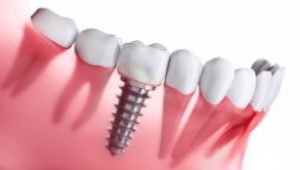 There’s no question that dental implants are the “gold standard” in tooth replacement. They mimic the roots of natural teeth and provide countless benefits that you simply can’t get from other options. Not to mention that they have a very low failure rate of 2% in non-smokers! But while that’s certainly a low percentage, it does mean that implant failure isn’t unheard of. If you have a dental implant that starts feeling loose, it doesn’t automatically mean it will fail, but there are3 things you should do right away to minimize the chances. Learn more below!
There’s no question that dental implants are the “gold standard” in tooth replacement. They mimic the roots of natural teeth and provide countless benefits that you simply can’t get from other options. Not to mention that they have a very low failure rate of 2% in non-smokers! But while that’s certainly a low percentage, it does mean that implant failure isn’t unheard of. If you have a dental implant that starts feeling loose, it doesn’t automatically mean it will fail, but there are3 things you should do right away to minimize the chances. Learn more below!
Don’t Delay In Scheduling an Appointment
The absolute first thing you should do if you have a loose implant is to schedule an appointment with a dentist. The earlier they’re alerted to the situation, the more likely it is they can save the dental implant. For starters, after they’ve performed an exam they’ll know whether it’s the implant itself that’s loose or simply the restoration(e.g. the dental crown, bridge, or denture). If it’s the restoration, it can simply be tightened with special tools.
Once a dentist has identified the problem, they can recommend the best treatment. In some cases, the bone around the implant begins to deteriorate, which is a variation of gum disease called peri-implantitis. If it’s caught early enough, it can sometimes be treated with excellent oral hygiene habits and antibiotics. If it isn’t, the implant may need to be removed so the area can be treated before another implant is done.
In either situation, be sure to follow up on your dentist’s recommendations as soon as possible!
Chew Carefully
Try to chew on the opposite side of your mouth until your visit. Also, limit or avoid any tough, hard, or crunchy foods that “challenge” your implant (e.g. steak, nuts, crusty bread, crunchy fruits and vegetables, etc.) and focus on softer foods instead.
Leave It Alone Until It Can Be Evaluated
It can be tempting to “rock” the implant back and forth with your tongue, but be sure to leave it alone until you can be seen by a dentist. Rocking a loose implant will simply wear away at the bone and tissue that’s supporting it and add unnecessary stress. It can also lead to irritated or infected gums, which will only make the situation worse.
Remember, there’s a reasonably good chance that a loose dental implant can be saved if you follow these guidelines and seek out care early enough!
About the Author
Dr. Walter Kulick has decades of experience as a general and restorative dentist and is a graduate of the University of Pennsylvania School of Dental Medicine. His goal is to help his patients enjoy their implants for a lifetime, so he makes every effort to catch problems early and prevent implant failure as much as possible. If your dental implant is loose or you have any questions, he can be reached via his website.